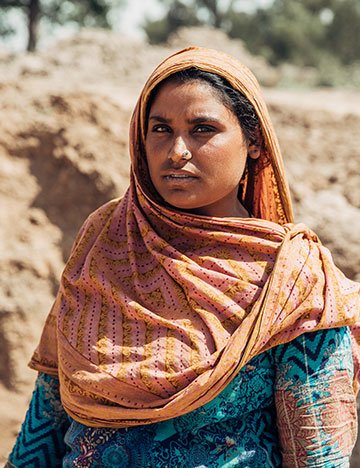Empowering equine owning communities
South East Asia is thought to have around 89 percent of the world’s ‘bonded labour’. An estimated 15 percent are working in brick kilns.

Thirty-five-year-old housewife Mumtaz Bibi (right) lives in the Malik Tariq Brick Kiln in Pakistan with her husband Manzor, 40, their seven children aged 16 to 23, and Sonu, their 12-year old mule.
Manzor earns 185 rupees (approximately £1) for every 1000 bricks he delivers. As this is only half the government minimum wage of 361 rupees, he and his children have to work long hours and Sonu must make twice the number of trips - each time carrying a heavy load of 400 bricks in his 1400kg cart – just to meet the family’s daily living expenses such as food and healthcare.
When the family first arrived at this brick kiln they borrowed money from the brick kiln owner to buy an equine, and then borrowed from him again to replace the animal when it died. This pattern was repeated and now the family is 600,000 rupees (£3,820) in debt. Under heavy pressure to repay it, the workload increases even more, for both the family and Sonu.
We find it difficult to find the money to buy medicines when our animals get sick and we often cannot afford to call the vet so often we have to borrow more money from the owner of the brick kiln,
The brick kiln owner deducts a set amount from their wages to repay the debt, and the family relies on their animals to meet the repayments. So last year when their horse and donkey showed signs of illness, they felt they had no choice but to continue to put them to work, unaware of the impact carrying further heavy loads would have on them.
It turned out that both animals had contracted trypanosoma - or ‘surra’ - a disease caused and spread by flies which leads to severe weight loss, fever and haemorrhaging. Diagnosis of surra is extremely difficult, and if not detected early enough the mortality rate for equines is almost always 100 percent.
Sadly, both animals died.
Our animals just suddenly became very weak and would not eat, we didn’t know what to do. By the time we called the paravet it was too late.
Brooke Pakistan’s advocacy manager Naeem Abbas told us: “The brick kiln industry is highly exploitative, brick kiln owners do not encourage discussion on wages. One of the main causes of debt in brick kiln workers is the purchasing of a new animal, that is why owners’ knowledge, skills and attitude towards the working animals it is so important.”
“We are also currently working on mobilising brick kiln owners to understand the value of working animals that are supporting the whole brick kiln industry.”
“I am very hopeful that we will be successful in empowering equine owning communities which were neglected in the past.”
